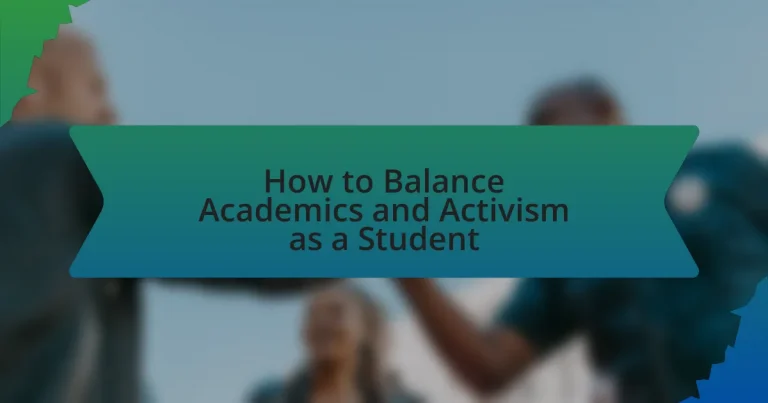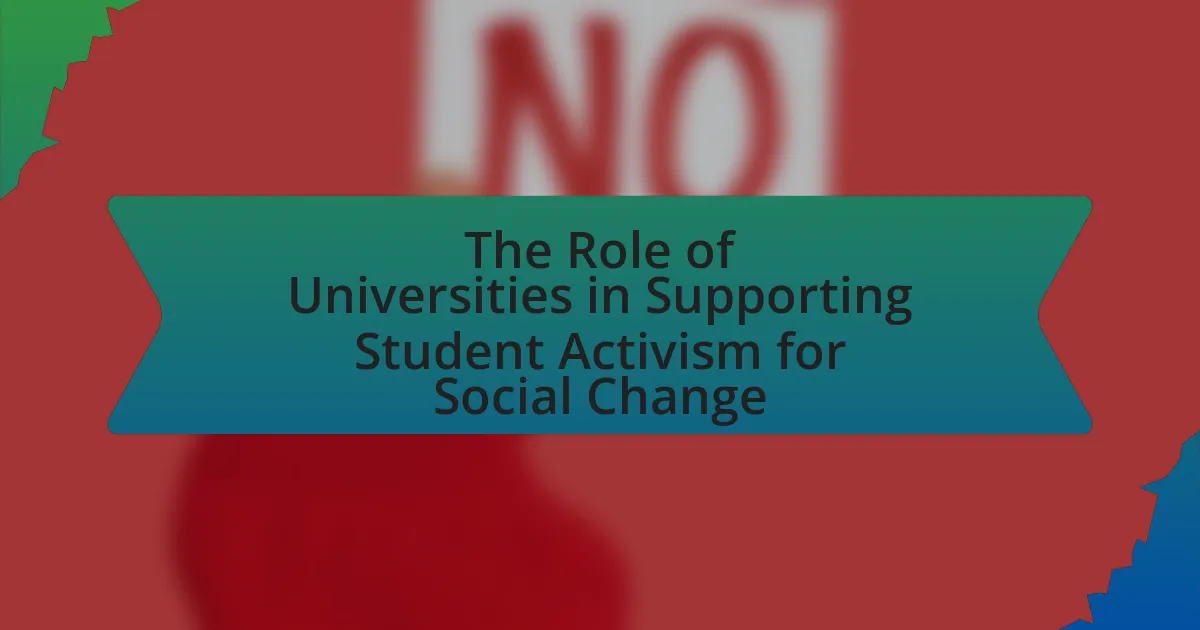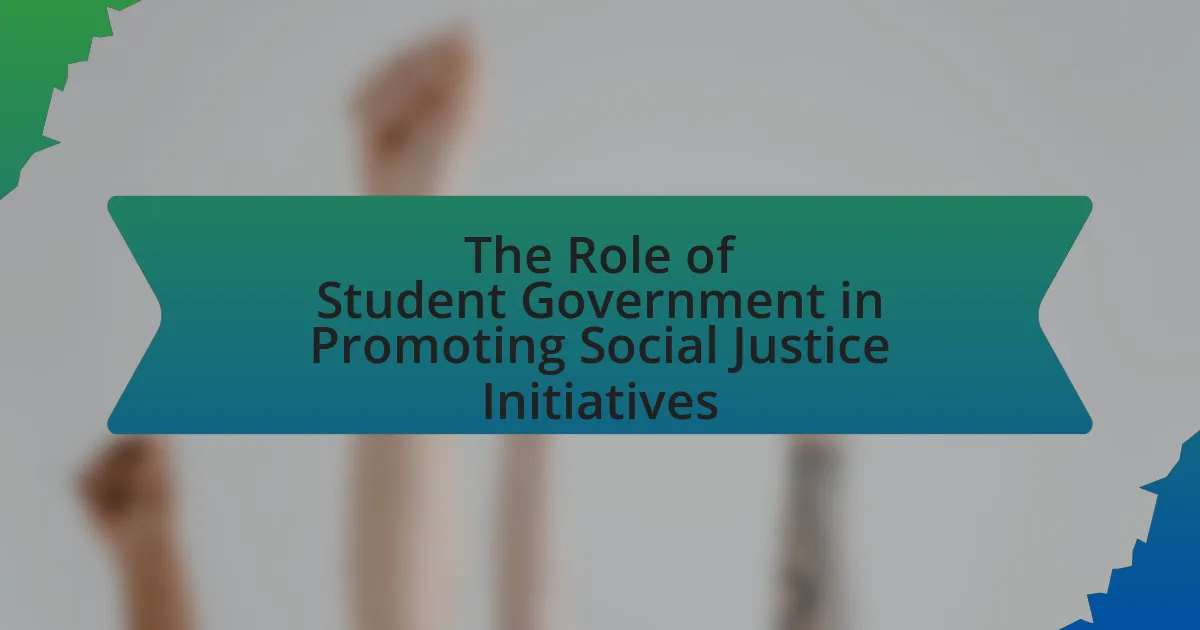The article focuses on the essential strategies for students to balance their academic responsibilities with their activism efforts. It outlines the importance of time management, goal-setting, and self-care in achieving this balance, emphasizing how personal values influence both academic and activist pursuits. The article also discusses the benefits of engaging in activism, such as enhanced critical thinking and social awareness, while providing practical tips and resources available to support students in managing their commitments effectively. Additionally, it addresses common challenges students face and offers solutions to navigate conflicts between academic deadlines and activism events.
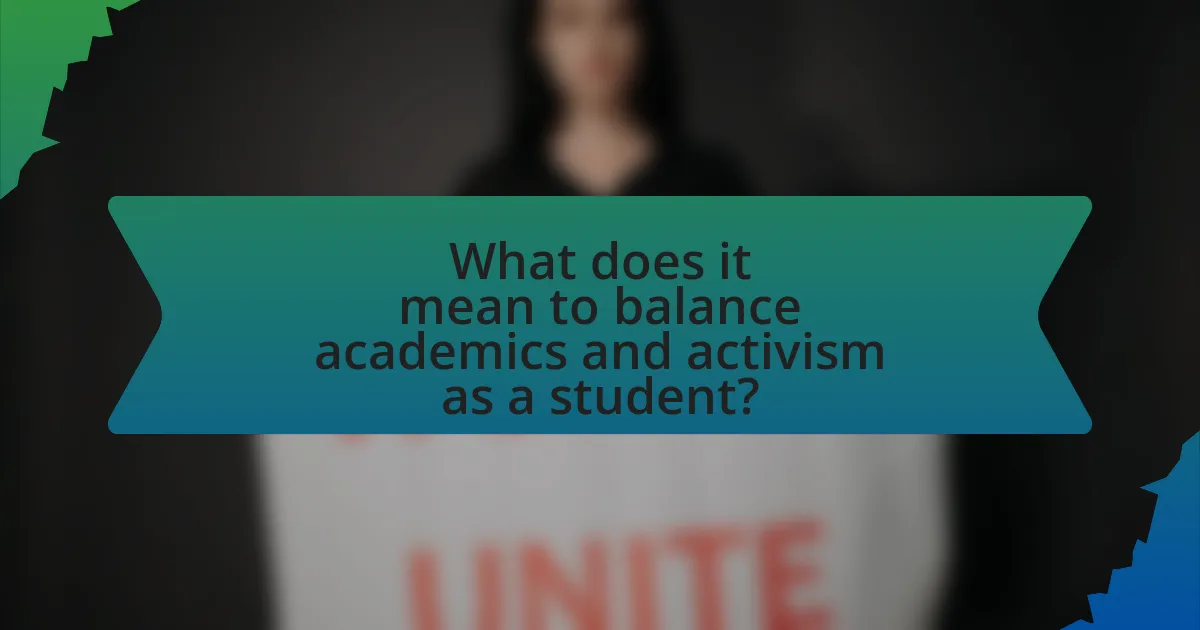
What does it mean to balance academics and activism as a student?
Balancing academics and activism as a student means effectively managing time and energy between educational responsibilities and social or political engagement. This involves prioritizing academic commitments, such as attending classes and completing assignments, while also participating in activism, which may include organizing events, attending protests, or advocating for social change. Research indicates that students who engage in activism can enhance their critical thinking and leadership skills, which can positively impact their academic performance. For instance, a study published in the Journal of Higher Education found that students involved in activism often report higher levels of engagement and satisfaction in their academic pursuits, demonstrating that a well-managed balance can lead to personal and educational growth.
How can students define their academic and activist goals?
Students can define their academic and activist goals by conducting a self-assessment of their interests, values, and skills, followed by setting specific, measurable, achievable, relevant, and time-bound (SMART) objectives. This approach allows students to align their academic pursuits with their passion for activism, ensuring that both areas support each other. Research indicates that students who engage in goal-setting are more likely to achieve their objectives, as evidenced by a study published in the Journal of Educational Psychology, which found that structured goal-setting significantly enhances academic performance and personal motivation.
What factors should students consider when setting these goals?
Students should consider their academic workload, personal interests, time management, and the impact of their activism when setting goals. Balancing academic responsibilities with activism requires an understanding of how much time and energy can be realistically allocated to each area. Research indicates that students who set specific, measurable, achievable, relevant, and time-bound (SMART) goals are more likely to succeed in both academics and activism. For instance, a study published in the Journal of Educational Psychology found that students who effectively manage their time and set clear priorities achieve higher academic performance while engaging in extracurricular activities.
How do personal values influence goal setting in academics and activism?
Personal values significantly influence goal setting in both academics and activism by guiding individuals in prioritizing their objectives and determining the actions they take to achieve them. For instance, a student who values social justice may set academic goals that align with their commitment to activism, such as pursuing a degree in sociology or political science to better understand and address societal issues. Research indicates that individuals who align their goals with their core values are more likely to experience higher motivation and satisfaction in their pursuits (Schunk, 2003, Educational Psychologist). This alignment fosters a sense of purpose, making it easier for students to balance their academic responsibilities with their activist endeavors, as they see both as integral to their identity and mission.
Why is balancing academics and activism important for students?
Balancing academics and activism is important for students because it fosters holistic development and prepares them for future challenges. Engaging in activism enhances critical thinking, communication skills, and social awareness, which are essential in academic settings. Research indicates that students involved in activism often achieve higher academic performance due to increased motivation and engagement in their studies. For instance, a study published in the Journal of Educational Psychology found that students who participate in civic engagement activities tend to have better academic outcomes, as they apply their learning to real-world issues. This balance allows students to cultivate a sense of responsibility and leadership while maintaining their academic commitments.
What are the potential benefits of engaging in activism while studying?
Engaging in activism while studying offers several potential benefits, including enhanced critical thinking skills, improved time management, and increased social awareness. Students who participate in activism often develop a deeper understanding of societal issues, which can enrich their academic pursuits and foster a sense of purpose. Research indicates that students involved in activism are more likely to exhibit higher levels of engagement in their studies, as they learn to balance their commitments effectively. Additionally, activism can provide networking opportunities, connecting students with like-minded individuals and professionals in their fields of interest, which can be advantageous for future career prospects.
How can activism enhance a student’s academic experience?
Activism can enhance a student’s academic experience by fostering critical thinking and engagement with real-world issues. When students participate in activism, they often analyze complex social, political, and economic problems, which deepens their understanding of related academic subjects. Research indicates that students involved in activism tend to develop stronger communication and leadership skills, as they must articulate their viewpoints and collaborate with others. For instance, a study published in the Journal of Higher Education found that students who engage in activism report higher levels of academic motivation and a greater sense of belonging within their educational institutions. This connection between activism and academic engagement demonstrates that activism not only enriches students’ educational journeys but also prepares them for future challenges in their careers and communities.
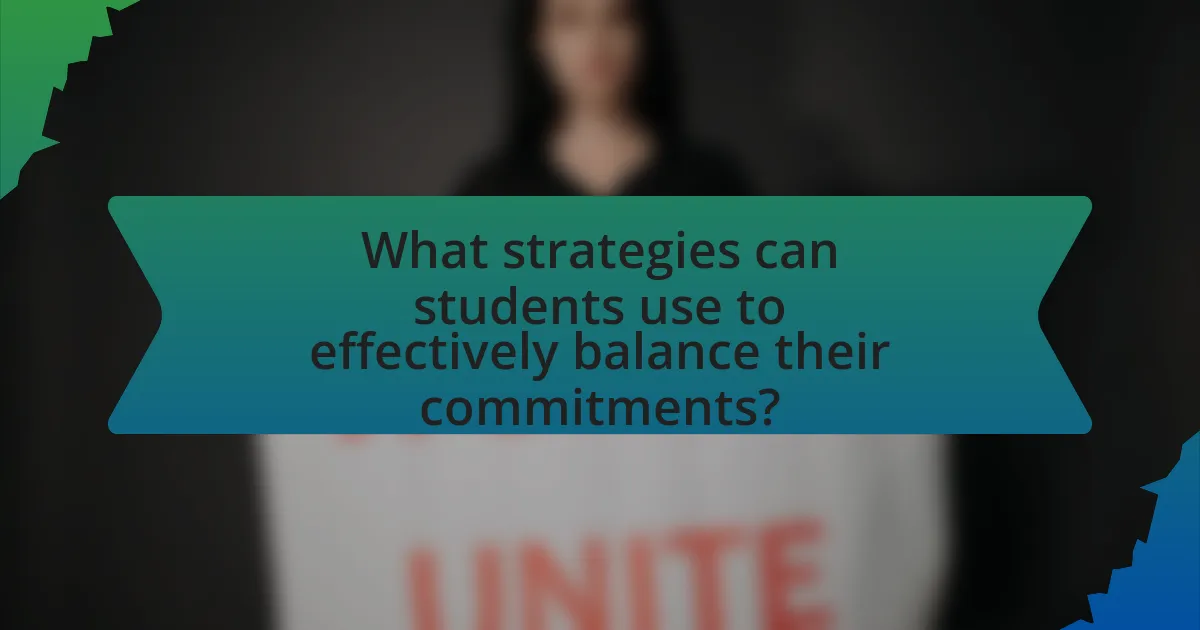
What strategies can students use to effectively balance their commitments?
Students can effectively balance their commitments by prioritizing tasks, managing time efficiently, and setting clear boundaries. Prioritizing tasks involves identifying urgent and important responsibilities, allowing students to focus on what matters most. Efficient time management can be achieved through techniques such as the Pomodoro Technique, which encourages focused work sessions followed by short breaks, enhancing productivity. Setting clear boundaries helps students allocate specific times for academic work and activism, preventing overlap and reducing stress. Research indicates that students who implement these strategies report higher satisfaction and lower stress levels, demonstrating their effectiveness in achieving a balanced lifestyle.
How can time management techniques help in balancing academics and activism?
Time management techniques can significantly aid in balancing academics and activism by enabling students to allocate their time effectively between studying and engaging in social causes. By employing strategies such as prioritization, scheduling, and setting specific goals, students can ensure that neither their academic responsibilities nor their activism efforts are neglected. For instance, using tools like planners or digital calendars allows students to visualize their commitments, helping them to identify free time slots for activism without compromising their study time. Research indicates that effective time management can lead to improved academic performance and reduced stress levels, which are crucial for students involved in activism.
What specific time management tools can students utilize?
Students can utilize specific time management tools such as digital calendars, task management apps, and time tracking software. Digital calendars like Google Calendar allow students to schedule classes, deadlines, and events, providing reminders and visual organization. Task management apps such as Todoist or Trello help students prioritize tasks and break projects into manageable steps, enhancing productivity. Time tracking software like Toggl enables students to monitor how much time they spend on various activities, helping them identify areas for improvement. These tools are effective in managing academic responsibilities while engaging in activism, as they promote organization and efficiency.
How can prioritization of tasks improve balance?
Prioritization of tasks can improve balance by enabling students to allocate their time and energy effectively between academics and activism. When students identify and focus on high-priority tasks, they can ensure that essential academic responsibilities are met while also engaging in meaningful activism. Research indicates that effective time management, which includes prioritization, leads to reduced stress and increased productivity, allowing students to maintain a healthier balance between competing demands. For instance, a study published in the Journal of Educational Psychology found that students who practiced prioritization reported higher satisfaction and lower anxiety levels, demonstrating the positive impact of this strategy on overall balance in their lives.
What role does self-care play in maintaining balance?
Self-care is essential for maintaining balance, as it directly impacts mental and physical well-being. Engaging in self-care practices, such as regular exercise, adequate sleep, and mindfulness, helps students manage stress and prevent burnout, which is crucial when balancing academics and activism. Research indicates that students who prioritize self-care report higher levels of academic performance and emotional resilience, demonstrating that self-care is not merely a luxury but a necessity for sustaining productivity and engagement in both academic and activist pursuits.
How can students incorporate self-care into their busy schedules?
Students can incorporate self-care into their busy schedules by prioritizing short, intentional breaks throughout their day. Research indicates that taking breaks can enhance focus and productivity, with studies showing that even brief pauses can improve cognitive function and reduce stress levels. For instance, the Pomodoro Technique, which involves working for 25 minutes followed by a 5-minute break, has been shown to help maintain mental clarity and prevent burnout. Additionally, students can schedule self-care activities, such as exercise or mindfulness practices, into their calendars just like academic commitments, ensuring they allocate time for their well-being amidst their busy lives.
What are the signs of burnout that students should watch for?
Students should watch for signs of burnout, which include chronic fatigue, decreased academic performance, lack of motivation, irritability, and feelings of detachment. Chronic fatigue manifests as persistent tiredness that does not improve with rest, while decreased academic performance is characterized by lower grades and difficulty concentrating. Lack of motivation often leads to procrastination and disinterest in schoolwork. Irritability can result in mood swings and conflicts with peers, and feelings of detachment may cause students to withdraw from social interactions and activities they once enjoyed. Recognizing these signs early can help students take proactive steps to manage their well-being.
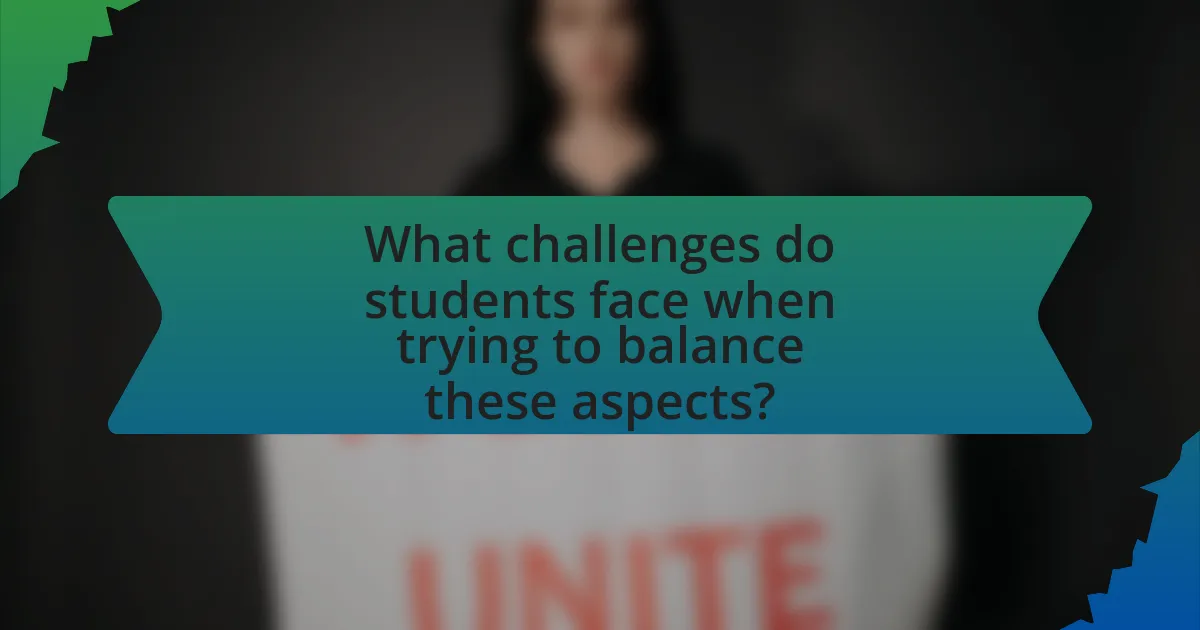
What challenges do students face when trying to balance these aspects?
Students face significant challenges when trying to balance academics and activism. The primary challenge is time management, as students must allocate sufficient hours to both their studies and their activism efforts. Research indicates that students involved in activism often report feeling overwhelmed, with 70% stating that their commitments interfere with their academic performance. Additionally, emotional and mental fatigue from activism can detract from their focus on academic responsibilities, leading to decreased grades and increased stress levels. Furthermore, students may encounter conflicts between academic deadlines and activism events, making it difficult to prioritize effectively.
How can students overcome common obstacles in balancing academics and activism?
Students can overcome common obstacles in balancing academics and activism by implementing effective time management strategies and prioritizing tasks. By creating a structured schedule that allocates specific time blocks for studying and activism, students can ensure that neither area is neglected. Research indicates that students who utilize time management techniques, such as the Pomodoro Technique or time blocking, report higher academic performance and greater satisfaction in their extracurricular activities. Additionally, setting clear goals for both academic and activist pursuits helps students maintain focus and motivation, allowing them to navigate potential conflicts between the two effectively.
What strategies can be employed to deal with academic pressure?
To effectively deal with academic pressure, students can employ time management techniques, such as prioritizing tasks and creating structured schedules. Research indicates that students who utilize time management strategies report lower stress levels and improved academic performance. For instance, a study published in the Journal of Educational Psychology found that effective time management correlates with higher grades and reduced anxiety among students. Additionally, practicing mindfulness and stress-reduction techniques, such as meditation or deep-breathing exercises, can help students maintain focus and emotional balance, further alleviating academic pressure.
How can students navigate conflicts between academic deadlines and activism events?
Students can navigate conflicts between academic deadlines and activism events by prioritizing their commitments and creating a structured schedule. Effective time management allows students to allocate specific time blocks for studying and participating in activism, ensuring that neither responsibility is neglected. Research indicates that students who utilize planners or digital calendars report higher academic performance and better engagement in extracurricular activities. By setting clear priorities and deadlines for both academic work and activism, students can achieve a balance that supports their educational goals while actively participating in social causes.
What resources are available to support students in this balance?
Students can access various resources to support their balance between academics and activism, including academic advising services, mental health counseling, and student organizations focused on social justice. Academic advising services provide personalized guidance on course selection and time management, helping students prioritize their commitments effectively. Mental health counseling offers emotional support and coping strategies for managing stress related to balancing these responsibilities. Additionally, student organizations often provide networking opportunities, workshops, and events that encourage engagement in activism while fostering academic success. These resources collectively empower students to navigate their dual roles effectively.
Which campus organizations can assist students in their activism efforts?
Campus organizations that can assist students in their activism efforts include student government associations, social justice clubs, environmental organizations, and cultural affinity groups. These organizations provide resources, networking opportunities, and platforms for students to engage in activism. For example, student government associations often have funding available for activism-related events, while social justice clubs focus on issues like equality and human rights, facilitating discussions and actions around these topics. Environmental organizations mobilize students for sustainability initiatives, and cultural affinity groups advocate for the rights and representation of specific communities, thus supporting diverse activism efforts on campus.
How can academic advisors help students manage their commitments?
Academic advisors can help students manage their commitments by providing personalized guidance on course selection, time management strategies, and prioritization of responsibilities. They assess students’ academic and extracurricular activities to create a balanced schedule that aligns with their goals. Research indicates that students who engage with academic advisors are more likely to succeed academically and maintain a healthy balance between their studies and other commitments, as advisors can offer resources and support tailored to individual needs.
What practical tips can students follow to achieve a successful balance?
Students can achieve a successful balance between academics and activism by prioritizing time management and setting clear goals. Effective time management involves creating a structured schedule that allocates specific time blocks for studying, attending classes, and engaging in activism. Research indicates that students who use planners or digital calendars report higher academic performance and reduced stress levels. Additionally, setting clear, achievable goals for both academic and activist pursuits helps students maintain focus and motivation. For instance, the SMART criteria (Specific, Measurable, Achievable, Relevant, Time-bound) can guide students in defining their objectives, ensuring that they remain committed to both their studies and their activism efforts.
